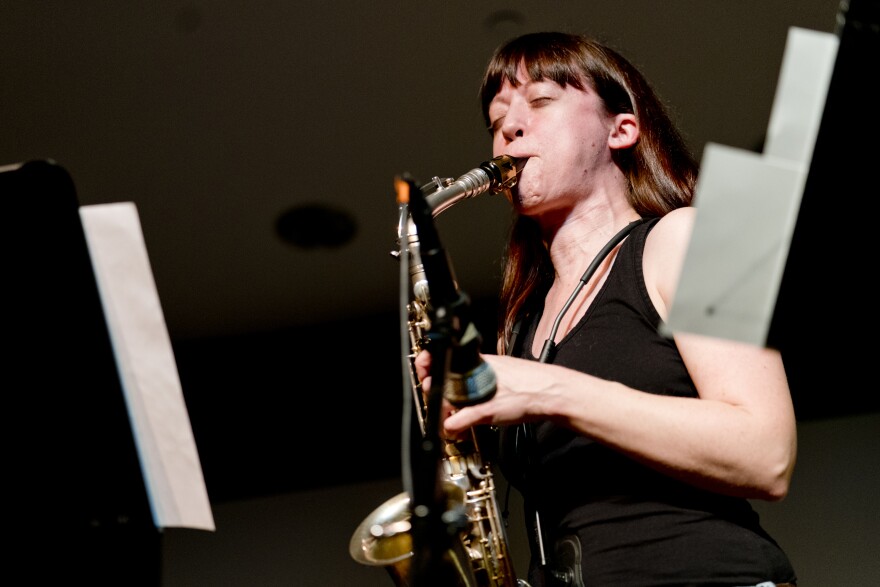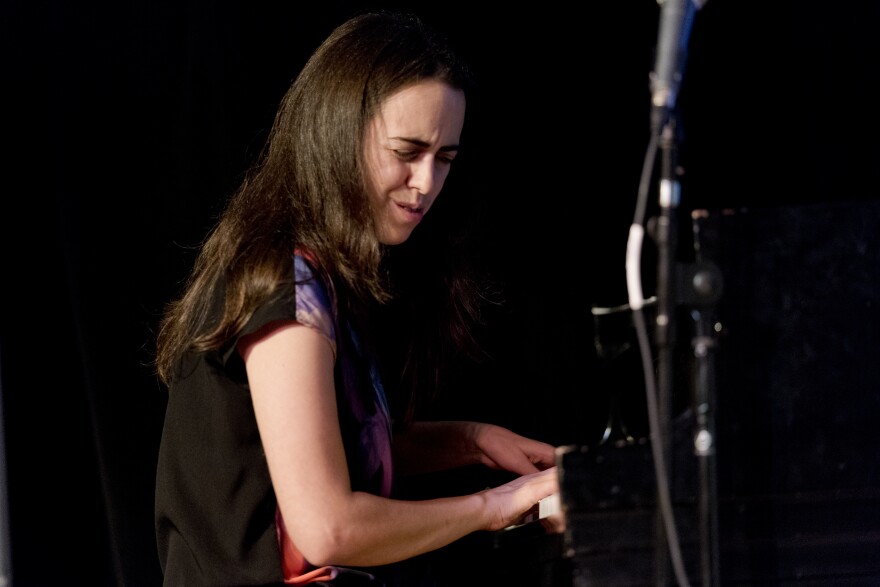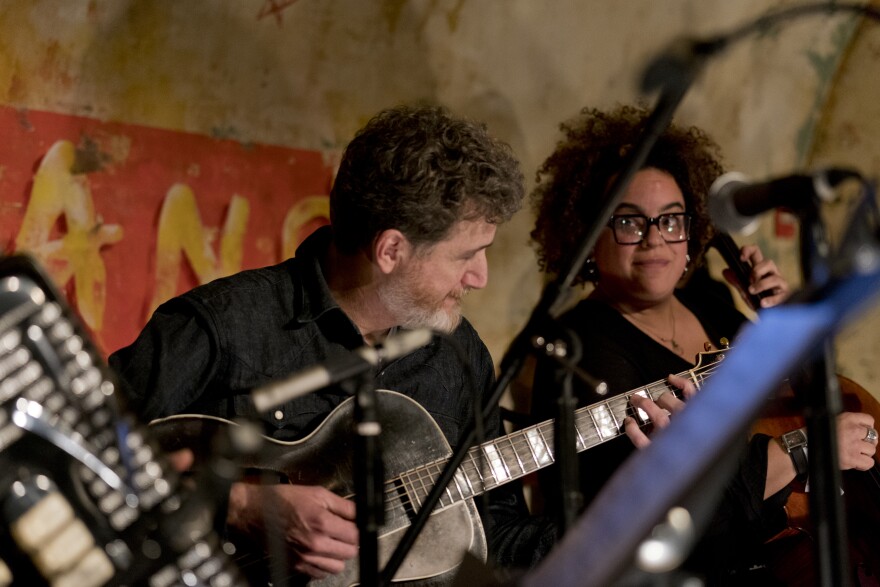“Art hurts. Art urges voyages — and it is easier to stay at home.” Gwendolyn Brooks wrote those words just over 50 years ago, for her poem “Chicago Picasso.” They resurfaced late on Friday night at the New School Tishman Auditorium, as part of the 2018 Winter Jazzfest Marathon.
This was during Art and Anthem: For Gwendolyn Brooks, a chamber-jazz affair conceived by the flutist Nicole Mitchell and featuring the pianist Jason Moran. With Brooks' verse entrusted to the poet Erica Hunt and the singer Shana Tucker, the project held a place of prominence on the marathon, and in one sense summed up the spirit of this roving and expansive yet often introspective event.
More than 100 bands took part in this year's marathon, which sprawled over nearly a dozen spaces south of 14th Street in Manhattan. Some 3,500 people attended the marathon on Friday, and about 5,000 on Saturday. As always, navigating the schedule is an exercise in timing and trajectory, and in shifting priorities. No two paths are identical. No two listening experiences are the same.
But the Winter Jazzfest urges voyages, as Gwendolyn Brooks might put it. In that spirit, here are impressions from two seasoned marathon-goers: Nate Chinen, director of editorial content at WBGO, and Josh Jackson, former vice president of content at WBGO, who’s now director of programming at Virginia’s WVTF.
Night One: Hitting a Stride (by Josh Jackson)

Seasoned long-distance runners value the taper. I arrived in New York rested and ready for a long run.
Early Friday evening, the incantatory insistence of two drummers, a tuba player, and a very tall saxophonist throbbed in a ritual trance at Le Poisson Rouge. Here, Sons of Kemet proffered their reanimating ceremony to a full room of openmouthed tiny screen watchers and voyeur videographers. Shabaka Hutchings, a saxophonist freshly coronated by the ecclesiastics and tastemakers, pulsated while the newly converted pilgrims bobbed along to the pulse. The Old Way to Canterbury, it seems, goes through Egypt these days.
Next came trumpeter Jaimie Branch at Nublu, whose ensemble FLY or DIE played restlessly between those two possibilities of being alight and crashing. Branch’s tone is open and purposeful, whether she’s smearing a plunger-muted note into a microphone or hoisting a trill to the ceiling with indirect amplification. Chad Taylor skittered across the forms on his drum set, and he left plenty of space for vibraphonist Joel Ross to ring out a galaxy of notes. The set was carefully constructed with enough daring to make you believe it could fall apart. The momentum pivoted on every turn of Branch’s White Sox baseball cap, and the band rallied to the finish.
The audience poured out into the uncharacteristically wet and balmy January night, leaving guitarist Matthew Stevens on deck at Nublu. It was a venue mismatch of sorts, and only a tiny contingent stayed for a really inspiring performance. Stevens played music from his album Preverbal, and he shredded ardent lines on his powder-blue solid body, all of it imbued with rock lineage and hot currency. Drummers Josh Dion and Zach Danziger added their deep knowledge of fusion-era patterns. Stevens was expecting a guest appearance from his collaborator Esperanza Spalding, but a delayed flight kept her grounded. Had she arrived, this would have been the show that everyone would talk about but nobody saw. Winter Jazzfest has these moments.
Meanwhile, Aaron Parks played anthemic music to a large crowd at Subculture. His group, Little Big, seemed to enjoy the interplay, but I could only sporadically hear them over the din. Those lucky enough to have a spot in the centralized stadium seating area had a more pleasant listening experience. Everyone else was having a Friday night party with live music as background. There’s nothing inherently wrong with that, but I left quickly for a quieter experience.
Tishman Auditorium is the best venue for dedicated listening. It was the proper place to hear a tribute to Gwendolyn Brooks from the festival’s resident artist, Nicole Mitchell. I heard “Riot,” “The Chicago Picasso,” “the Battle,” and “A Bronzeville Mother Loiters in Mississippi. Meanwhile, A Mississippi Mother Burns Bacon.” Brooks’ poetic portraiture of African-Americans rested comfortably within Mitchell’s original work, and pianist Jason Moran added to the narrative of liberation and song.
I ended the first marathon night on the fifth floor theater at the New School Jazz Building. Saxophonist Sarah Manning was the final set there, and she led her band Underworld Alchemy into some adventurous space. Melody wasn’t the point here; group interplay and cellular level composition was. Manning played her alto saxophone like a blade cutting into viscera. I heard 20 minutes of unleashed searching with a raucous and occasionally cathartic fury. I looked to my right to find a young couple kissing in the dark. At first glance, it seemed way too unnatural in this space at this time. But it may have been evidence of success. Anger had transmuted into something far more improbable in these dark times.
Night One: Carnival Rhythm and Contemplation (by Nate Chinen)

The fervent bark of Shabaka Hutchings’ tenor brought a jolt to two separate sets on Friday, first in an ecstatic and pummeling Le Poisson Rouge performance by Sons of Kemet. Part of an ascendant London jazz scene — alongside peers like his fellow saxophonist Nubya Garcia, the standout talent on a British Jazz Showcase two nights earlier — Hutchings is expanding his already high profile. He’s now an Impulse! artist: the new Sons of Kemet album, Your Queen Is A Reptile, is due out on the label in April. Its live show is an unabashed party, with two drummers feeding the churn while Theon Cross huffs lively parade syncopations on his tuba.
Carnival rhythm formed an unexpected through-line for my marathon path, propelling not only Sons of Kemet but also portions of several other sets. One of these, somewhat to my surprise, was by Acoustic Unity — the surging trio led by Norwegian drummer Gard Nilssen — at The Bitter End.
My colleague has weighed in on Jaimie Branch and FLY or DIE, which I also caught in brief. Last year I saw the band with Tomeka Reid on cello; here I was struck by her substitute, vibraphonist Joel Ross, who brought out the fiery side of Chad Taylor’s drumming.
His subtler side emerged in a meditative set by the Mara Rosenbloom Trio, whose leader worked at the piano with pensive harmony and flickering pulse. Rosenbloom has a probing and watchful style as an improviser, building cycles of implication and digression. Her trio, which pairs Taylor with bassist Sean Conly, knows how to follow her lead; it’s a band best experienced in long stretches, with undivided attention.
Those are difficult commodities during the marathon, which can burden any listener with Grass Is Greener syndrome. But I managed to settle in for a few contemplative acts, including Sara Serpa’s Recognition, a chamber trio with Ingrid Laubrock on tenor saxophone, Zeena Parkins on harp, and Serpa singing or reciting text about 17th-century anti-colonial rebellions in Angola. (This was an intriguing idea that needs a bit more time in the incubator.) And Mitchell's Art and Anthem created a quiet space to lean into, even with assertive drumming by Shirazette Tinnin.
My evening ended with a regal yet playful set by the saxophonist and AACM elder Ernest Dawkins, with his New Horizons Ensemble. (It featured pianist Vijay Iyer, coming from Birdland, where he had just played two sold-out sets with his sextet.) But first there was the raging fun of an all-star jam at the Bowery Ballroom — the second set to feature Hutchings, alongside saxophonists Donny McCaslin and Lakecia Benjamin.
This rave-up had come together in about an hour, after Rudresh Mahanthappa, dealing with a family emergency, canceled a set by Indo-Pak Coalition. The resulting jam was blustery and unreserved, a funk explosion — but drummer Makaya McCraven brought slanted grace to his club beat, keeping the beat steady while hinting at an undercurrent of disruption.
Night Two: Derring Do and Durable Truths (by Josh Jackson)

Mercifully, only two of the eight Winter Jazz Festival evenings are marathon events. There’s a bevy of artists, managers, agents, presenters, educators and media types who fellowship around this particular January weekend, making it one of few times such a loose confederation comes together. Encouraging conversations are happening around racism and inequality, sexism and gender disparity, making a living wage and more. The audience will not expand (or even refresh) unless the house is in order.
Derring do can come from anyone. Take Sasha Berliner, a young vibraphonist who has written openly about the jazz patriarchy, environmental sustainability and other topics. Her efforts made me want to hear her quintet at the New School on this second marathon night. I could hear distant echoes of the Bobby Hutcherson/Harold Land Quintet, but this is music from a different time, place and personage. More than half the band was women, including the principal soloists, Berliner and saxophonist Maria Grand. I heard an original called “Polaris” and a solid version of Vijay Iyer’s “Far From Over.” That’s a tidy description of Berliner’s career.
Trumpeter Marquis Hill’s Blacktet followed. Hill’s set included some original work like “To Be Free” and his update on the Gigi Gryce blues classic, “Minority,” the latter receiving rowdy social calls from vibraphone soloist Joel Ross, Hill, and drummer Makaya McCraven.
Most of the Blacktet waited in the cold outside SOB’s to hear Nicholas Payton’s Afro-Caribbean mixtape. Payton set the terms midway into the set. He led the chant on “Jazz is a Four Letter Word,” and the audience sang in response. They danced to funky, elemental grooves on “Kimathi” and “Junie’s Boogie.” It sounded every bit like a coup de grace.
The scene at The Django bordered on disruptive for Matt Munisteri’s Tropical Hot Club. Bar patrons enjoying their bespoke Parisian experience outmatched the acoustic guitar sound on Nick Lucas’s “Picking the Guitar” and Eddie Lang’s “Rainbow Dreams,” and I heard cellist Marika Hughes only because I sat a few feet away from the stage.
The crowd eventually settled. Munisteri, on his third set of the night and his first as leader, plugged into an amp to cut through the rest. I heard versions of Trinidadian composer Lionel Belasco’s “Miranda” and “The Palms of Maracaibo,” along with a song from Martinique’s Eugene Delouche — and yes, even a Django tune. It was a lovely timbral combination of guitar, mandolin/clarinet, accordion, cello and percussion. More so, the Tropical Hot Club was a happy reminder that in an age of impermanence, some things are built to last.
Night Two: Darkness and Light (by Nate Chinen)

The ephemeral ecology of the Winter Jazzfest marathon can sometimes feel tilted toward riotous fissures and urgent abstraction. So it felt almost like counterprogramming to plant myself at The Bitter End, early in the going on Saturday, for the soul-affirming sustenance of Ranky Tanky.
A South Carolina band that draws inspiration from Gullah folk traditions, Ranky Tanky has garnered acclaim — on Fresh Air and elsewhere — for the familial glow of its vocal harmonies and the gentle stir of its rhythmic root system. This performance came alive whenever the band’s superb lead singer, Quiana Parler, stepped to the microphone. But it also had a locomotive pull courtesy of drummer Quentin Baxter, who made every groove feel inexorable and effortless.
Groove assumed more volatile dimensions in the music of Kate Gentile, a drummer and composer who led her New Quartet, with Matt Mitchell on piano, Kim Cass on bass and Jeremy Viner on saxophone and clarinet. This group released an ambitious and defining debut, Mannequins, last year. But rather than take a victory lap here, Gentile devoted the set to a body of all-new compositions. They shared a dark strain of harmonic tension, which Mitchell fleshed out at the piano with patience, hyperclarity and a precarious sort of grace.
Mitchell stayed on in the same room for a highly anticipated outing with Starebaby, the new jazz-metal hybrid led by his close associate Dan Weiss. With Weiss on drums, Mitchell on synthesizers, Craig Taborn on piano and Trevor Dunn on bass, it’s as much an experiment in tonal calibration as a show of demonic force.
For a good stretch of the performance, in fact, Weiss sat in meditative silence while Taborn wrested all manner of drama from a resonant hum and decay of overtones. So even without guitarist Ben Monder, an MVP on the band’s forthcoming, self-titled debut, Starebaby made the application of texture and color an event unto itself. As for metal’s influence on the music, it ran deep even when it was subtle, like a slow, molten ooze of magma under the continental crust.
Judging only by the name, you might mistake Pterodactyl for another jazz-metal hybrid. A collective composed of Nicole Mitchell on flute, Sara Serpa on vocals and Liberty Ellman on guitar, it has in mind a more delicate and songful expression. And in its second-ever performance, opening the evening’s lineup at SubCulture, the trio fulfilled its elegant promise, putting beauty at the top of its agenda.
For Mitchell especially, who has distinguished herself as the Winter Jazzfest artist in residence, it’s an ensemble with the potential to open more doors — reaching listeners who might not leap at the poetic supposition that Art hurts. Mitchell knows from experience that the inverse can also be true, even truer: Art heals.














